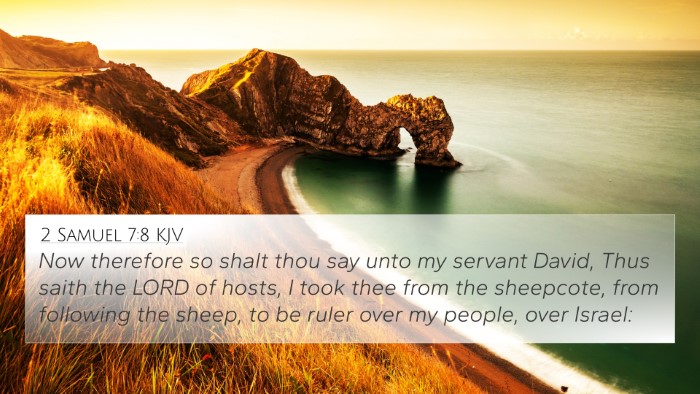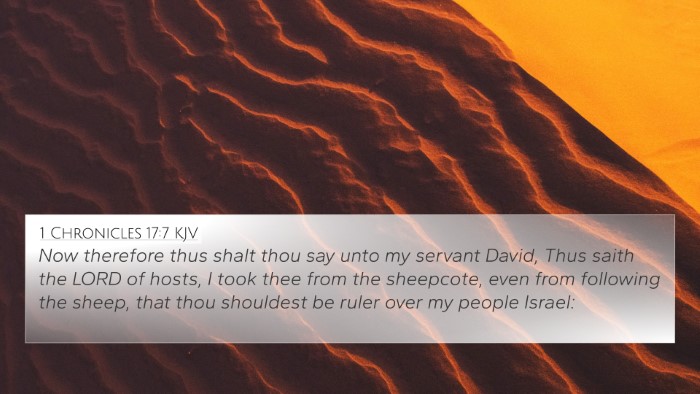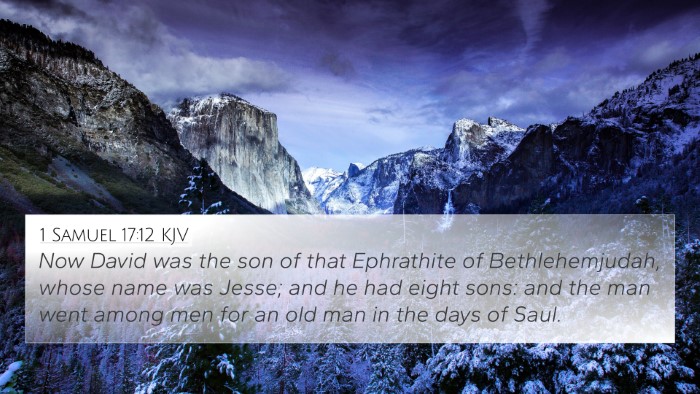Understanding 1 Samuel 16:11
Verse: "Then Samuel said to Jesse, 'Are all the young men here?' And he said, 'There remains yet the youngest, and there he is, keeping the sheep.' And Samuel said to Jesse, 'Send and bring him. For we will not seat ourselves until he comes here.'
Summary of Meaning
This verse marks a pivotal moment in the anointing of David as king of Israel. Samuel, the prophet, is sent by God to anoint a new king after Saul. Upon meeting Jesse, David's father, Samuel discovers that Jesse has another son—David—who is tending the sheep. This indicates not only David's humble beginnings but also God's choice of him as a leader, demonstrating that divine selection often transcends human expectations.
Commentary Insights
- Matthew Henry:
Henry highlights the importance of David's humble role as a shepherd, suggesting that God's anointed leaders often come from the most unassuming backgrounds. This foreshadows Christ, referred to as the Good Shepherd, underlining the thematic connection between shepherding, care for the flock, and leadership.
- Albert Barnes:
Barnes emphasizes the reality that God's anointing does not rely on outward appearances or societal status, as Jesse overlooked David initially. He connects this with the principle outlined in 1 Samuel 16:7, where God tells Samuel, "For the LORD sees not as man sees; man looks on the outward appearance, but the LORD looks on the heart."
- Adam Clarke:
Clarke discusses the significance of David being a shepherd, relating it to his eventual role in caring for Israel as its king. He points out the poetic irony in David’s initial lowly occupation compared to his future greatness, suggesting that God often equips leaders through life's humbling experiences.
Connections Between Bible Verses
Cross-References:
- 1 Samuel 16:7 - “But the LORD said to Samuel, ‘Do not look at his appearance or at the height of his stature, because I have rejected him. For the LORD sees not as man sees; man looks on the outward appearance, but the LORD looks on the heart.’”
- Psalm 78:70-72 - “He chose David His servant, and took him from the sheepfolds; from following the ewes that had young, He brought him to shepherd Jacob His people, and Israel His inheritance.”
- John 10:11 - “I am the good shepherd. The good shepherd lays down his life for the sheep.”
- Matthew 1:6 - “And Jesse was the father of King David. David was the father of Solomon, whose mother had been Uriah’s wife.”
- Acts 13:22 - “After removing Saul, he made David their king. God testified concerning him: ‘I have found David son of Jesse a man after my own heart; he will do everything I want him to do.’”
- 1 Peter 5:2-4 - “Be shepherds of God’s flock that is under your care, watching over them—not because you must, but because you are willing, as God wants you to be; not pursuing dishonest gain, but eager to serve; not lording it over those entrusted to you, but being examples to the flock.”
- Revelation 5:5 - “Then one of the elders said to me, ‘Do not weep! See, the Lion of the tribe of Judah, the Root of David, has triumphed. He is able to open the scroll and its seven seals.’”
Thematic Bible Verse Connections
The themes of divine selection and humility flow throughout the Bible. This narrative exemplifies how God often favors the unlikely. Exploring these connections unveils profound truths about God's character and His ways of choosing leaders.
Tools for Bible Cross-Referencing
Utilizing tools such as a bible concordance or bible cross-reference guide can greatly enhance understanding of scriptural links. Methods like cross-reference Bible study allow for a deeper exploration of narratives and themes that connect different texts.
Comparative Bible Verse Analysis
By conducting a comparative study of Pauline epistles or examining the links between the Prophets and Apostolic teachings, one can discern broader theological principles that inform faith and practice.
Inter-Biblical Dialogue
This exploration can serve as a pathway to understand how various verses converse with each other, revealing God’s continuous plan across the old and new covenants. The connections between David as king and Christ as King are particularly compelling, offering rich ground for theological reflection.
Conclusion
1 Samuel 16:11 invites readers to reflect on the ways God chooses and prepares leaders. By employing a thorough bible cross-reference system and recognizing cross-referencing themes in the Bible, one can cultivate a richer understanding of scripture as a unified narrative.








